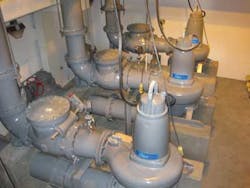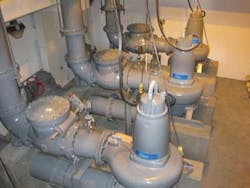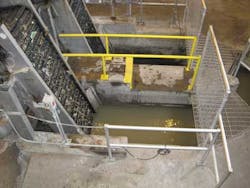Pump Upgrade Resolves Shaking, Leaking Seal Problems
After repeated pump failures at the Influent Pump Station for the Williams-Monaco Wastewater Treatment Plant operated by the South Adams County Water and Sanitation District (SACWSD), it made more sense to replace rather than repair the existing influent pumps.
The SACWSD plant, located in Henderson, CO, receives an average flow of 3.5 mgd, with 6 mgd spikes on weekends, from more than 250 miles of 8" to 30" collection lines serving 50,000-plus customers in the 65-square-mile service area North of Denver.
The William-Monaco WWTP has undergone three major expansions. In 1980, the new east side of the plant was constructed with rotating biological contactors (RBCs) for secondary treatment. In 1994 a bio-tower trickling filter system was added as well to the east side of the plant to supplement the RBCs and a shallow rock media trickling filter that is located on the old plant's west side.
In 2004 the plant underwent yet another expansion that involved the demolition of the old RBC system, the addition of a moving bed bio-reactor, and the addition of a new sludge digester, administrative building and garage that enabled the facility to comply with more stringent regulations addressing nutrient, nitrogen, chlorine, and bacterial levels in the treated effluent discharged into the South Platte River. The work increased the plant's capacity from 4.4 mgd to 8 mgd.
Ironically, these improvements coincided with recurring pump problems at the headworks. As part of the 2004 expansion, the district had replaced a series of 1980s-vintage long-shaft pump motors with four, 60 hp submersible pump motors but kept the dry pit configuration of the old pumps in the 27-ft. deep basement of the three-level influent station.
The pumps were designed to operate individually until sufficient flows occurred to activate a second unit. The pumps cycled in an alternating sequence, a common operations concept intended to equalize the wear on multiple pumps in a station. It was therefore easy to conclude that all of the headworks pumps began experiencing problems around the same time due to their age, equal wear and other shortcomings.
Wear and age, coupled with vibration, sudden jolts when the units shut off, air-locking and inadequate cooling contributed to the utility's mounting maintenance issues. Foremost among maintenance concerns was the erosion of seal integrity of the pumps that allowed leaks resulting in accelerated bearing wear.
After repair costs had grown to an unacceptable level, staff proposed replacing one of the pumps. Based upon price, performance, and warranty, the Water Technology Group of Cogent, a Denver-based water and wastewater treatment and pumping systems specialist, was chosen by the district. Water Technology Group recommended replacing the 60-HP unit with a 60-HP Flygt N-Pump.
Wastewater personnel carefully studied the advanced features of the new-generation pumps as they related to the problems experienced at the district's influent pump station. Staff also toured another plant that was equipped with the pumps operating in a similar dry pit installation.
The Flygt brand pump, manufactured by Xylem, incorporated advancements absent in the existing pumps, including a patented impeller known for its clog resistance, ability to handle modern trash, and energy saving operation. The replacement pump's performance claims became evident in the monitoring by the utility's SCADA system.
District wastewater staff noted the N-pump immediately reduced energy consumption, drawing 25 to 35 percent fewer amps. The energy savings, operational performance, and five year warranty earned the district's confidence and decision to replace the rest of the existing headworks pumps in the next budgeting cycle.
Over the course of a three-month period, one by one the existing troublesome pumps were replaced as they failed or as the work load allowed.
Water Technology Group specialists also noted other features that favored the N-Pump for the remaining replacements. A primary feature was the double tungsten carbide seals whose mechanical strength would withstand thousands of hours of high-pressure operation under extreme conditions. Cooling would also improve because the pumps employed a glycol-based, closed-loop motor cooling system, unlike the plant water used to cool the old pumps. Finally and perhaps foremost, all Flygt N-pumps are specifically engineered to reduce shaft deflection resulting in less vibration, a nemesis the district's staff blames for many repairs needed by the old pumps. The five year warranty was an added bonus appreciated by management.
District staff partially engineered the replacement program in-house with the local office of Burns & McDonnell providing backup expertise. The engineering firm modeled and reviewed the pump curves to verify the delivery rates of the former pumps. They designed new header connections for the new pumps, and oversaw the installations and submitted reviews. The firm also conducted vibration tests that confirmed the new pumps would operate without the vibration that had plagued the old submersible dry-pit pumps for years.
Xylem is an exhibitor at the WEFTEC.12 event and can be found at Booth No. 6239


